By Mumtaz Alam Falahi, TwoCircles.net
TCN series: Visit to Malda and Murshidabad: Part 6
If migration of local elite Muslim class to Pakistan in 1947 – and constant apathy since then of Indian governments towards the two Muslim-dominated districts of Malda and Murshidabad in West Bengal presumably in revenge – is a major reason of underdevelopment, illiteracy and acute impoverishment here today, no less big reason of poverty of lakhs of people is the erosion of their thousands of acres of lands by the Ganges over about two decades.
The River Ganga is fast eroding agricultural lands and habitations on the south-western part of Malda. The river – officially called Padma when it touches down Murshidabad at its northern-most point and flows along the eastern boundary of the district – is doing the same job of destruction on the eastern side of Murshidabad. While Ganga separates Malda from undivided Bihar the Padma is the divider between Murshidabad and Bangladesh.
The erosion-affected areas in the two districts are heavily Muslim dominated, and so those who lost their agricultural lands and homes are generally Muslims. This is believed to be one big reason why the authorities remained almost indifferent to the devastations, and did not come up with proper relief and rehabilitation programs.
Malda being eroded
To witness how the Ganga is eroding Malda and Murshidabad TwoCircles.net visited some affected areas there earlier this month.
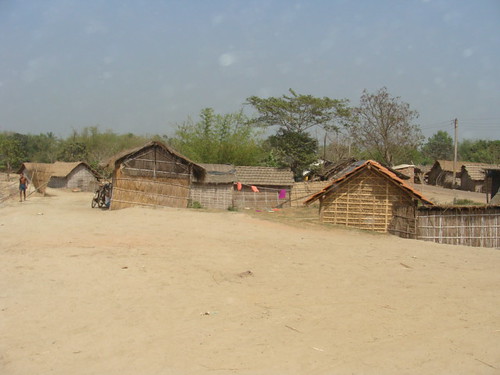
Huts of those who lost their land in Ganga
On 5th April we were on way to Paglaghat, a bank of Ganga, 15 km from Malda town. When we entered the straight road leading to the bank of the river we found about 10 km stretch dotted with shacks on either side of the road. Once the residents of these huts had acres of land, now they are forced to live in clusters of shacks made of bamboo on either government land or on private rented land. “Most of them are Muslims. Most of the families are forced to live in single-room huts. Parents are living with their son, daughter-in-law and grandchildren in the same room, says Noorul Islam Majidi, our one-time guide.” Many are forced to live on the road side. “Several maulanas and imams who would once deliver speeches in religious programs are now forced to live in the huts,” Majidi adds. When they have no proper means to meet their both ends who talks about education of their children? Village after village have been gulped down by the river.
When we reach Paglaghat we find children and women bathing in the river. Some of them have bathed and are coming out. The Ganga has intruded 12 km deep into Malda at this point. This has rendered thousands of people homeless. We talk to some children whose parents and other family members are living in the huts on the bank.
These children have just come out of the river and are half naked. One of them is Mohsin Shaikh. His father now catches fish to keep body and soul together. Rajab Ali’s father is jobless while Inamul Sheikh’s father is agricultural labour. This is general situation here. “About 90% of the affected people are Muslims. Their agricultural lands have been washed away by the river but the government has not done relief and rehabilitation work properly,” says Majidi.
When the Ganga hits stone-walled area of Rajmahal district in Jharkhand (in the west of Malda with Ganga in between), it turns back to the east and consequently usurps lands of Malda as the embankment areas here have not been fortified.
Of late, the government has started work on embankment. At present they are fortifying the banks at Manikchak area, about 50 km from main town of Malda. And this is just to save Malda town which has just 2% Muslim population. “The government is making all efforts to save the town as it has businesses of other community. Bu they are not working to protect Kaliachak, hub of Muslim businesses in Malda,” says Majidi and warns pointing to the river: If it flows over the Paglaghat area it will sweep Kaliachak away into Bangladesh.

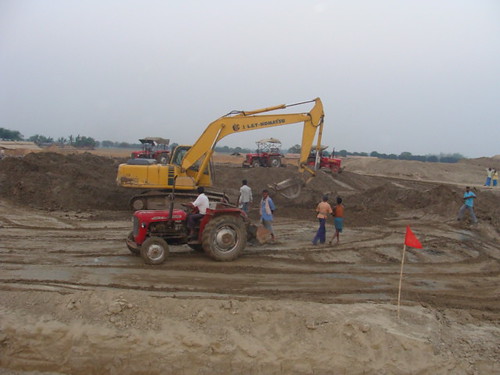
Work on to save Malda from soil erosion
Erosion in Murshidabad
The Padma River that flows around the northern and eastern wall of the district has so far destroyed thousands of acres of agricultural land and habitation of local people. Like erosion-affected people in Malda, Muslims are overwhelming majority of the erosion affected people in Murshidabad also.
TCN visited Jalangi area about 70 km in the east from Behrampur, district headquarters of Murshidabad. Here too we find cluster after cluster of shacks and huts wherein are residing people who were once owner of acres of land.
We are walking on an embankment in Jalangi. On our right is dry extension of Padma River and on left are clusters of huts erected by people whose farmlands and habitation were gulped by the river. On the long embankment there are several villages.
This is Tolltoli village. An elderly Muslim tells us how his land was washed away by the river. Now he has a hut on the embankment. “In the beginning the government had given us 24 kg rice a month and a little help to make hut. Since long they have not come back to find out about us,” he says. He lives in the hut with his son and daughter-in-law. His son is agricultural labor.
This is Shaheedul Mondal from the same village. Once owner of 60 bigha of land Mondal is now agricultural laborer and lives in hut on rented land. His four sons work in fields in Kerala.
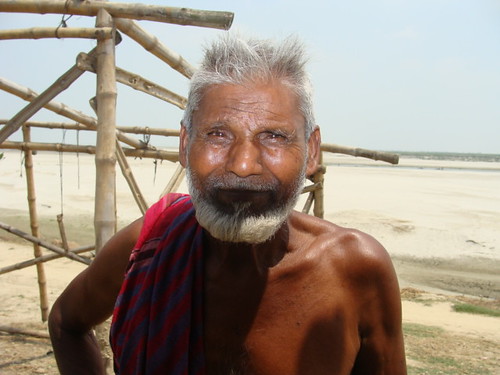
Khilafat Mondal
Next village is Paraspur on the same embankment. Khilafat Mondal has just come out of a ditch in the middle of the dry extension of Padma. He had gone there to bath. Ask him about his old home, he will point finger to far east in the direction of Bangladesh. He was living in India on the bank of Padma River that separates the area from Bangladesh. The river has eaten into his 120 bighas of land with banana trees in four bighas and now he is living in a hut.
Starvation deaths in Murshidabad
In early months of 2005 the situation was very grim here. People were dying of hunger as they had nothing to eat. Their farmlands and homes were washed away by the river and the government was not paying attention. The government was not accepting that there were starvation deaths for impending local elections.
Even after elections the government remained apathetic. Almost all affected people deserved BPL card but it was issued to very few of them. The affected persons were not properly rehabilitated. The poverty eradication program was not implemented either. NREGA, central government rural employment guarantee scheme, was also not implemented properly.
Zafrul Islam Khan’s initiative
The news about starvation deaths in the Muslim dominated Murshidabad was broken on Zafrul Islam Khan, Editor, The Milli Gazette, by Hong-Kong based Asian Human Rights Commission on March 7, 2005. Khan immediately forwarded the mail to President of India, Chief Minister of West Bengal, National Human Rights Commission, state Human Rights Commission, United Nations’ Special Rapporteur on the Right to Food, National Commission for Minorities but he got no response. He published an article in his fortnightly English language tabloid, yet he failed to stir the rulers and the ruled.
What was a shameful act on the part of the CPM-led Left Front state government was that it knew about the starvation deaths but was not acting. Zafrul Islam Khan came to know through local media reports that state government was aware but not acting for political reasons. Municipal elections were due in May 2005. By acting on the issue they did not want to accept the reality. Khan immediately sent his representative to the area to get first hand repot and arrange relief. Khan himself visited the area in mid-April that year.
After visiting hunger death affected areas in Murshidabad he filed a PIL with Supreme Court praying it to intervene and direct centre and state for immediate relief. Sadly, little came out of the PIL. But he did not sit down. He opened a charity in Ghoshpara of Jalangi area in May that year and started weekly free grains distribution program for 360 most deserved people. The program run by Charity Alliance has continued till date without a break.
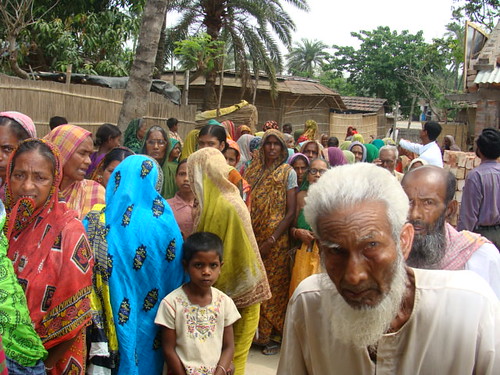
People in queue to get weekly food relief from Charity Alliance in Ghoshpara, Murshidabad
Overall situation in Jalangi today is not good. There is no work and no industry in the area. There is some occasional agricultural work. “NREGA is not being implemented properly. Out of 100 days guaranteed work under the scheme people get work only for 5-7 days,” says Ghulam Kibriya Sarkar, Ghoshpara resident. The situation has forced working men to move to other states like Kerala for work.
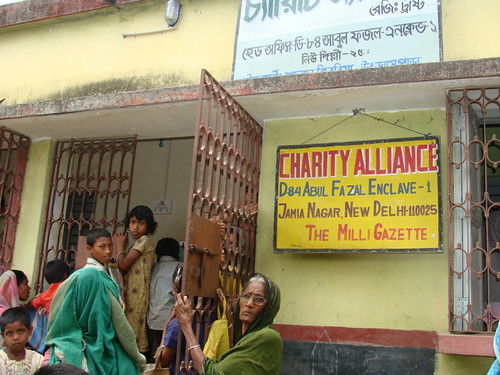
People geting weekly food relief from Charity Alliance in Ghoshpara, Murshidabad
Link:
http://www.charityalliance.in
